Ming looks for reassurance on Awkward.
Celebrating America meant that there wasn't as much television as usual, but let's pick at the offerings that we did get.
It was the first viewer elimination on Duets, and maybe the judges' predictions about Jason being popular with the ladies was right because he wasn't even in the bottom three. [Not coincidentally, the bottom two were the two girls. The most predictable thing about these voting shows is the way that the male contestants are so often favored.] This meant that he got to stick around to sing "Feeling Good" by Nina Simone, a song that's right up Jason's alley and one that he described as being his father's style as well. Since Kelly fractured her ankle, Jason got to have more of the spotlight both in the song and on stage, which is a good thing for a guy who's been consistently outshone by his duet partner week after week.
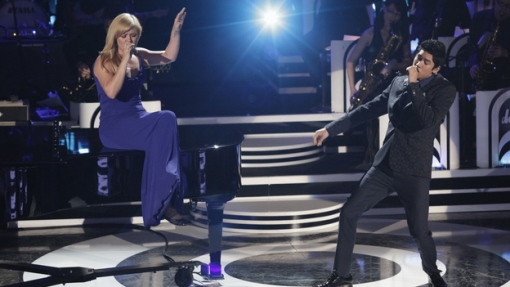
Jason gets to work the stage all on his own.
The performance was nice with Kelly seated on a piano and a big band behind them, though Kelly apologized immediately after they finished for messing up. John is impressed by how much Jason has improved from the start of the show, Robin missed a little bit of the soul of the song, and Jennifer seconded the notion that Jason's growth on the show has been inspiring. It's not the highest praise ever, but it just might be enough for Jason to make it into the top three.
It was an intense week on Push Girls when the subject of stem cell surgery came up as a possible way for the women to regain mobility. We learned that Angela actually did have surgery after her accident that transferred stem cells from her nasal cavity to her spine, which is how she was able to have limited movement in her arms. It seemed like a real story of hope until the conversation turned to embryonic stem cells, which Auti, who believes that life begins at conception, is against. The discussion went back and forth between the women with nothing close to a resolution reached, but Angela was moved to visit a neuroscience researcher to learn what developments have been made in spinal cord repair. The doctor had little in the way of concrete news but a lot of confidence and positivity for Angela, who was moved to tears by the thought of being able to touch a loved one's face. Dang, if that didn't bring a tear to your eye, you're made of stone.
The crux of this week's plot on Awkward. had the students scrambling after footage from a security camera was leaked and everyone fretted about the hookups and other secrets that would be revealed. Ming merely rolled her eyes at everyone's nerves, saying, "Kinda hard to get in trouble when you're uber boring and have no secrets. It's a good day to be Asian." I reflexively bristled at that line a bit, but then I had to admit to myself that I made similarly generalizing, ha-ha-I'm-so-funny comments in high school. And possibly even last week. Ahem.
But then things got a bit odd. As tensions started to max out, main character Jenna called upon her pal Ming to turn to "her people" because "the Asians know everything about everything." It turns out the Asian students knew about an earthquake before it happened and they threw a girl a baby shower before she knew she was pregnant. Just as I started raising my hackles again, Ming responded, "Asians aren't magic. They don't have control over everything." Quick cut to the school flag, which has a Greek titan riding on a dragon. Okay, dragon imagery aside, these aren't typical stereotypes in any way, right? The exaggerated use of premonition as a quality of Asians is so over the top that it's clearly a joke, right? Do people get that it's a joke??
Another cut to "the Asian table" of the cafeteria, where we see a girl eating with chopsticks and another one, looking prim and besweatered in a very Rachel Berry way, rigidly hitting buttons on -- sigh -- a calculator. The calculatorer, whose name is Becca and is played by actress Jessika Van, robotically spits out Ming's full name and address before Ming can complete her half-hearted greeting. Becca knows all sorts of things about Ming's family, explaining that Asians make up 30% of the Palos Verdes population, so it's important to know everything about them. The only thing she doesn't know (and I hope you'll forgive this detailed play-by-play, by the way) is whether Ming is "a cool Asian or a school Asian." Since her PSAT scores are low and she's never had any spring breaks in Cabo or affairs with indie rock band members, she's neither. With a note of true pity and some apology, Becca informs Ming, "You're white." Okay that's definitely another conversation I've had a version of over the years. Again I wonder, do non-Asian people realize that this is a joke? Do they really think we would seriously categorize ourselves thusly? I remind myself that this is a high school show about (relatively) unsophisticated teenagers. Deep breath.
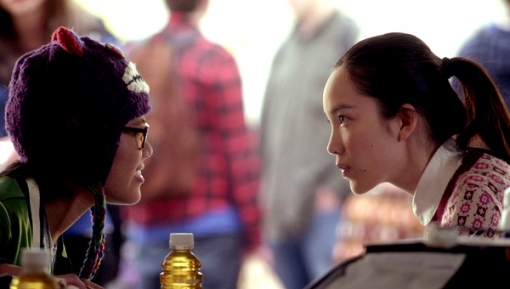
Ming (left) is incredulous at the weird things that Becca says.
Over sushi, Ming finally gets to the purpose of her visit, that she needs a copy of the security footage for a friend. "We don't stick our necks out for round eyes," Becca calmly informs her. When Ming calls her racist, Becca quickly counters, "No it's not! Their eyes are round ... you're a racist." She then explains that she changed her name from a Chinese one (Wong Fung-Wen, it sounded like) to Becca because "Everyone's a racist. [pause] I'm kidding! [laughs, then a snap to serious head shaking, then smiles, then more deadpan head shaking]." Before Ming parts, Becca hands her the answers to the next day's history test (her low grades have been making them look bad).
Okay, so what just happened here? This was actually a nice little send-up of the all-too-often exclaimed, "But their eyes are slanted/squinty/however a person 'truthfully' describes Asian peepers." Also can't deny that Van is a pretty terrific comedic actress. But I keep coming back to the question of whether people know it's a joke. Anyone who's Asian or spends time with Asian people (and/or is just plain reasonable) would immediately recognize the stereotypes and exaggerations being played with here, but a (possibly paranoid) part of me still wonders whether this is a 21st century version of the "inscrutable" Asian: the omnipotent Asian. It may be silly to think that anyone would really believe that anything happening here is based in reality, but as someone who grew up in an almost entirely white community, I can speak to how powerful the representations of people I had no experience with could be. Even now, 20+ years after I was at least semi-believing the portrayals of the very rich, the very poor, the urbanites, the rural farmworkers, the openly gay, the African American, the Latino, and yes, even the Asian, I wonder how much of that false belief cycle repeats itself over and over.
All this isn't to say that I have a real problem with anything shown or done in the episode. In the end, Becca and her "Asian mafia" crew did indeed procure the video, unleashing some chaos on the student body and the school administration. It all ended with her telling Ming, "You're in our circle of trust now," which hopefully means that Becca will be back. Further development of a teenage Asian American character? Looking forward to it.






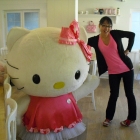

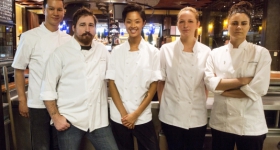
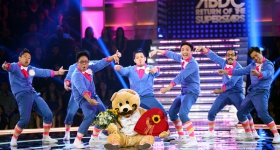
Comments
Believe me, I work regularly with high school juniors and I've seen firsthand how dismal some of their critical thinking skill are. But just as I wouldn't want people making generalizations about me, I hesitate to dismiss ALL teens so completely. Still, short of overhauling the American education system entirely, what's to be done? My hope is that shows like Awkward. continue to grow and develop all their characters beyond the stereotypes that get easy laughs. I'm keeping the faith that shows aimed at young audiences like this one will all strive for complex, diverse, and progressive characters and plotlines, thus chipping away at the massive rock that is ignorance, laziness, and racism.